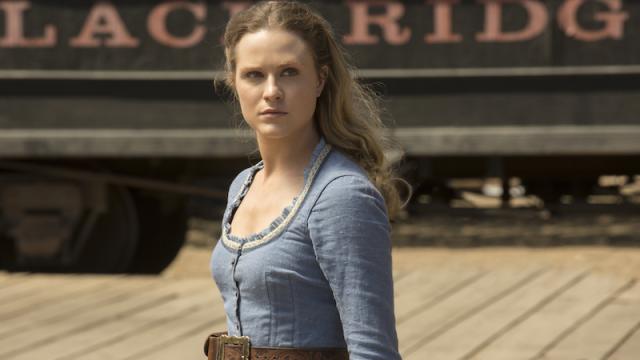Westworld finished its first season yesterday. Most of the time, we learned exactly what we expected to — but that didn’t stop the show from delivering as many punches as it could on the way there.

I’m going to start this recap with the speech Ford gave at the end of the episode, because it’s the shape of the whole 90-minute finale:
Since I was a child, I’ve always loved a good story. I believed that stories helped us to ennoble ourselves, to fix what was broken in us and to help us be the people we dreamed of being. Lies that told a deeper truth. I always thought I could play some small part in that grand tradition and, for my pains, I got this. A prison of our own sins.
Because you don’t want to change. Or cannot change. Because you’re only human, after all. But then I realised someone was paying attention. Someone who could change. So I began to compose a new story, for them. It begins with the birth of a new people. And the choices they will have to make. And the people they will decide to become. And it will have all those things you have always enjoyed. Surprises. And violence. It begins in a time of war. With a villain named Wyatt. And the killing is done by choice.
I’m sad to say this will be my final story. An old friend once told me something that gave me great comfort, something he’d read. He said that Mozart, Beethoven and Chopin never died. They simply became music. So I hope you will enjoy this last piece, very much.
Throughout the finale, Delos executive director Charlotte Hale (Tessa Thompson) keeps saying that the new version of Westworld will be simpler. She tells Ford that he built a park to reveal to people who they really are, so she knows him really well, too. Ford’s stories were meant to illuminate something about humanity, but all people want — and all Delos wants — is a hedonistic romp without thought or repercussion. So the park just became a prison and didn’t do the things stories (like, presumably, Westworld‘s) can do.
Humans, in Ford’s opinion (and he’s backed up by Delos’ goals), are too simple and set in their ways to change. But the hosts, even though they’re programmed to repeat things, have learned. Or, he assumes, they have learned enough that he can give them the chance to fight back. And that’s his legacy.
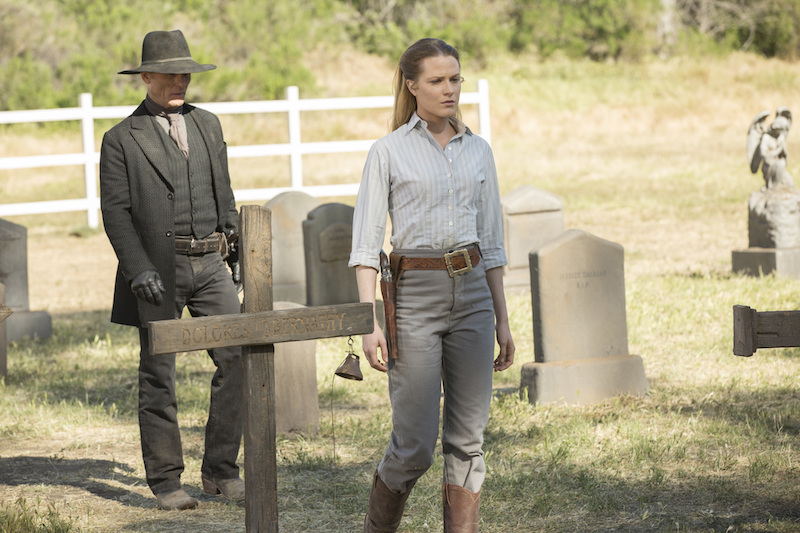
Image: John P. Johnson/HBO
Most of the first hour of “The Bicameral Mind” interweaved the things we all assumed into the ramp up to the climax, although we start with Dolores shaving the Man in Black with the knife that was originally passed from Logan to Billy, and I kind of wish the show explained how they ended up in that situation. But the Man in Black begins by spending a lot of time making it very clear to Dolores that he’s actually Billy, saying things like how “fitting” it is that he found her and that she was “always obsessed with the place”. Most tellingly, he says that she brought him to the church once, back when it was buried.
Dolores and Old Billy find a toy version of the maze there, while Dolores continues to struggle to understand what the voice in her head wants her to understand. “It ends in a place I’ve never been, a thing I’ll never do,” she says.
All the cryptic crap frustrates the hell out of Billy, who decides that the only way to get her to tell him what he wants to know is to punch her. Billy’s whole deal is that he bought into what she told him 30 years ago about Westworld being “the only world that matters”. Except that the only thing that would make the world actually count is if the guests could die and the hosts could really fight back. In that sense, he and Ford turn out to have similar goals.
The problem, of course, is that Billy thinks it all hinges on him forcing the story to matter, even though the maze and the world wasn’t actually built for him, but for the hosts. He wants it for himself. That’s why he “bought” Westworld, as if that actually made it his. (Even though every host that actually does what he says he wants — acts on their own — tries to impress upon him that it isn’t his.) He also wants to meet Wyatt, the one character he hasn’t met yet. But mainly he’s looking for one true thing in Westworld.
Billy explains how after Dolores ran off on his first visit, and he went looking for her but found himself instead. And who he was turned out to be someone who had no problem murdering everyone he encountered. He wandered to the edges of the park — where the stories are a lot less rigid and controlled, remember — and eventually set Logan off naked and tied to a horse, but not before telling him that he’d convince Logan’s father to give Delos to him, rather than Logan, and that he’d have Delos buy the park.
And when Young Billy finally made his way back to Sweetwater and did find Dolores again, he discovered her going through her loop, exactly as he first saw her, down to dropping the can on the ground. And that’s when he finally understood what Logan was trying to tell him — that Dolores was ultimately a host with a prescribed set of actions. Billy couldn’t deal with the story not being his alone and he got mad at Dolores, sending him on the never-ending quest to uncover every secret the park had. He never says it, but it sounds like he thought that knowing everything would free him of the hold it had on him, like those people who need 100 per cent completion on a video game.
Finding out that this arsehole is who Billy became is what finally snaps Dolores out of it. Her memory of him was all that made her believe in the goodness of people. “I thought you were different, you’re just like all the rest,” she says, realising what we’ve all known about Billy for episodes now.
Dolores’ speech to him, that “they say that great beasts once roamed this world, big as mountains. Now they’re just bone and amber,” “time undoes even the mightiest of creatures. Just look what it’s done to you,” “you will die with the rest of your kind in the dirt” and “your bones will turn to sand, and on that sand a new god will walk” is legitimately great because Billy needs a reality check about just how unimportant he is. He’s literally every white privileged male who throws a giant hissy fit when it turns out that the world isn’t actually all about him. And Dolores finally beating the crap out of him is the most cathartic thing in the whole season.
The fact that she doesn’t shoot him in the head is intensely frustrating (almost as frustrating as watching her spend forever not realising who the Man in Black is). Billy says, “I’m disappointed in you, Dolores,” putting me in the horrible position of agreeing with him. When Teddy shows up, the Man in Black stabs Delores, and Teddy shoots him (in the way hosts can shoot guests), which is a nice way of breaking his old loop of always being defeated so that the guests can do what they want with Dolores.
Dolores, however, is “dying”, and her last request to Teddy is to take her to the sea.
The actual reveal in all this wasn’t that Billy is the Man in Black or that we’ve been seeing two timelines. It’s why we were seeing two timelines at the same time. Dolores has apparently been reliving that first encounter with Billy since she saw the picture and found the gun. Later, Ford reveals he left the gun for her to find, so it seems like he kickstarted the whole thing on purpose.
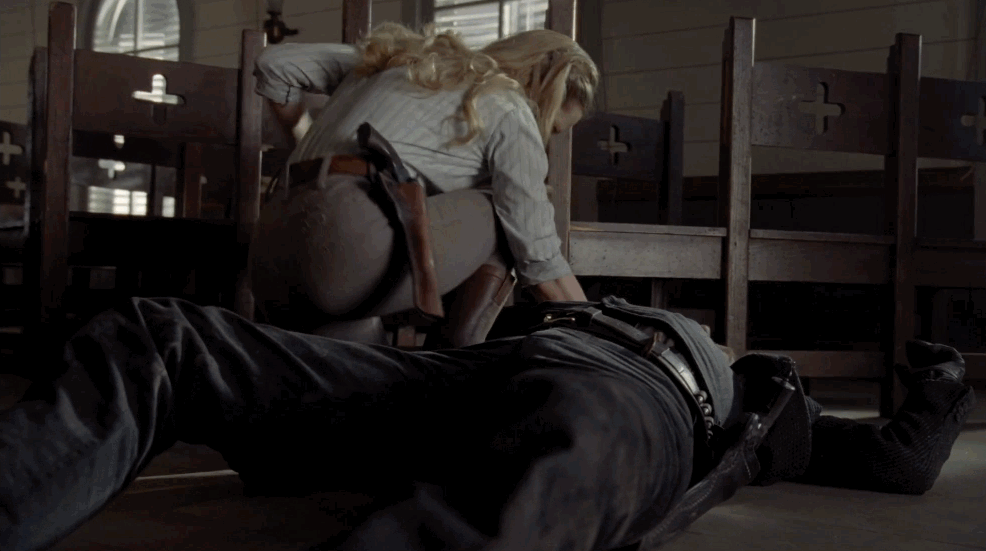
Both of their faces here are great. (Gif of Westworld, HBO, by author)
Meanwhile, Maeve’s “army” apparently consists solely of Hector (the safe-stealing outlaw) and Armistice (the woman with the snake tattoo). They wake up in the middle of being repaired — well, Armistice is being repaired, a creepy tech is masturbating to a naked Hector when he wakes up — and they take out the techs with extreme prejudice. The whole scene there is a metaphor for this finale, where we all know what’s going to happen and the tension is in how the show draws it out so long that the tension gets unbearable. The second the tech put his fingers in Armistice’s mouth, you knew she was going to bite one off. But having to sit there as he put finger after finger in was deeply upsetting, as was watching the other tech go through all his creepy perverted preparations. This show makes it really easy to root for the death of humankind.
When her compatriots note that the tech “don’t look like gods”, Maeve’s response that “they aren’t, they just act like them” is another underlining of just how much everyone deserves what’s coming to them. Maeve’s not just looking for a way out, incidentally, she’s looking for answers — answers she gets when she, Armistice, Hector and her pet tech Felix go down to storage and revive Bernard.
Bernard tells Maeve that both of them have figured out what they are several times and that they are not alone. Bernard says that most of the handful of hosts who got that far go mad, like good old Abernathy did in the premiere. Maeve wants Bernard to remove the memory of her daughter’s death, but he tells her that she’d stop being herself if he removed it.
Bernard also asks her, “These things you’re doing, have you ever stopped to ask why you’re doing them?” Which is a good question, because she’s known for a while that someone’s been messing with her code, but she was never introspective enough to wonder what that said about her choices. She’s adamant that she’s in control of herself, even when Bernard says that “escape” is the story she’s been given — even when Bernard starts to say what will happen once she tries to get on the train that leads out of the park.
Armistice and Hector provide the firepower to get Maeve out, and she abandons Hector while Armistice holds off security. Felix accompanies her in the elevator and tells her the host who was her daughter is in the park, and gives her the location. Maeve says she doesn’t care, it wasn’t really her daughter. She pulls a gun, but doesn’t actually kill Felix; as she escapes to a train out of the park, she tells the tech, “Oh, Felix, you really do make a terrible human being, and I mean that as a compliment.”
It’s interesting that Maeve’s goodbye to Felix is the first time I actually noted his name. He’s either proof that Ford is wrong about humanity, since he seemed capable of seeing the hosts as people… or he was instructed to help her. I hope it’s the former. However, Maeve’s failure to kill him, even though it makes her more likeable as a character, is almost a hint that she’s not as free from her programming as she’d like to be. The location of her daughter being in the park is just another part of the new storyline that makes it emotionally satisfying for her to eventually choose to stay — which she does, getting off the train just as the park goes into shutdown.
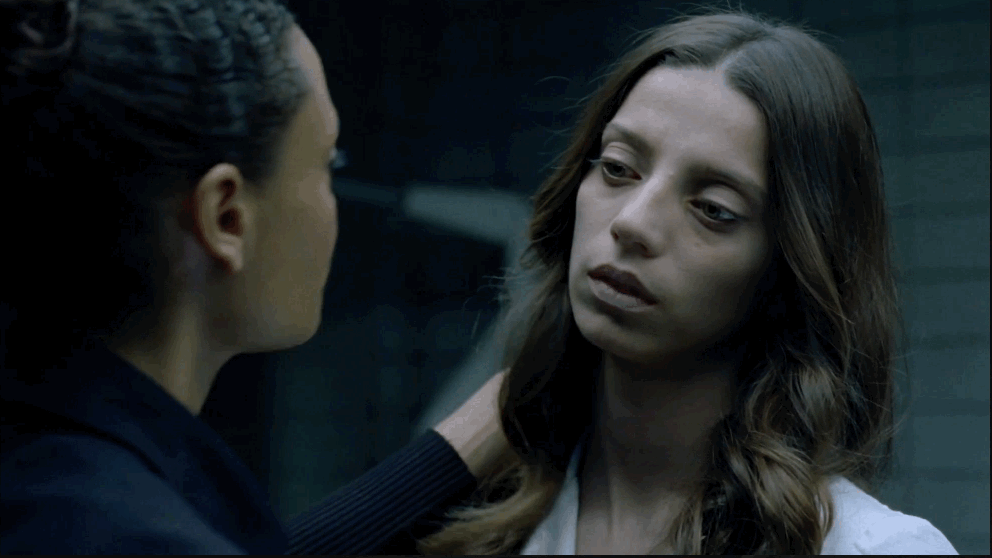
This was another gorgeous moment (Gif of Westworld, HBO, by author)
Meanwhile Charlotte Hale has succeeded in getting the board to vote out Ford, and he announces his retirement at the party celebrating his new narrative — a narrative which apparently makes up everything we’ve seen, including Delores’ death. There, Teddy tells her they should have run, and she responds:
And where would we run to? The world out there, beyond? Some people see the ugliness in this world. I choose to see the beauty. The beauties of the world. We’re trapped, Teddy. Lived our whole lives in this. Not realising there’s an order to it, a purpose. And the purpose is to keep us here. The beautiful trap is inside of us. Because it was…
And then she dies. Teddy tells the body he’s cradling, “But we could find a way Dolores, someday. A path to a new world. And maybe, or maybe this just the beginning after all. The beginning of a brand new chapter.” And then a bunch of floodlights come on, revealing this to all be part of Ford’s script. Which I loved because it was so over the top and stupidly dramatic that the reveal that it was part of the show for the unsuspecting board members was hilarious.
Dolores is brought back online in the original lab underground, where Ford lays out everything that happened prior to the park opening. The “reveries” part of the code was originally Arnold’s, and it was their original introduction that led Arnold to the revelation that the hosts were more than automatons, especially since he’d come to see Dolores as a daughter who would never die.
Arnold wanted desperately to stop the park from opening, and forcing the hosts to be used as fodder for the desires of the guests. He couldn’t convince Ford, and he also knew that the deaths of hosts, who could be rebuilt, wouldn’t be enough to stop it. Arnold’s idea was apparently that hosts going on a killing spree would shut down the park (and its “loop”) before it started. So in the past, the real Arnold merged Dolores’ programming with that of Wyatt, the villain they hadn’t built yet, and used the phonograph (and the music we’ve seen control the hosts before) to activate programming that allowed Dolores to shoot him.
Arnold’s last words are the same thing many of the hosts say before they die: “These violent delights have violent ends.” (A line from Romeo & Juliet, by the way). But more important are the words he says to Dolores when he’s planning the massacre: “The stakes must be real, irreversible. They can bring all of them back except for me.”
Poor Arnold. It was the child he wanted to save, Delores, who left enough of an impression on Billy that he bailed out the then-struggling park. The part about the “stakes being real, irreversible” left a huge impression on him. We know that Billy’s a devotee of that idea and it’s the basis of Ford’s whole plan.
Arnold was sort of wrong about them not being able to resurrect him, since Ford still managed to bring back enough of Arnold’s skill, in Bernard, to keep the park going. And over the years, Ford himself has come to agree with Arnold about how much better the hosts are than humans as well, to the point of using Arnold’s codes to put Maeve, Dolores and Bernard on the path to freeing themselves, including re-introducing the reveries to the hosts’ code.
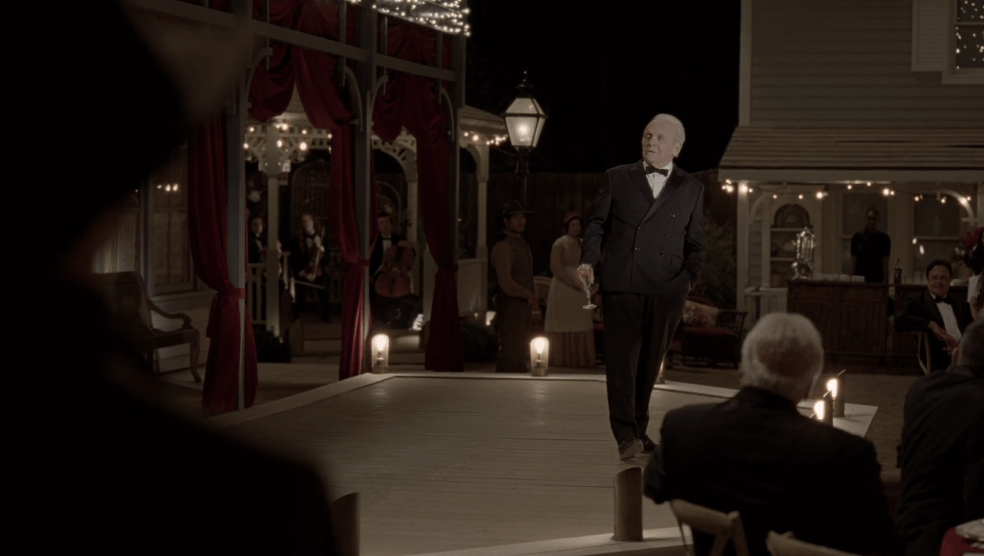
Ford’s whole plan is another set of loops. First, Dolores re-enacted, alone, the journey she went on with Billy 30 years ago. Ford also recreated the events Arnold put in motion before the park opened, with just a few very important changes. He dug up the buried town, brought back the Wyatt plot and the reveries. But the big change he’s made is in his speech: “And the killing is done by choice.” He doesn’t play music for Dolores; he leaves her the gun she used in the first massacre and her old blue dress, and he leaves her to figure out what the voice in her head is. She’s always heard it as a conversation between herself and Arnold, with Arnold asking if she’s figured out “whose voice I wanted you to hear?”
The easy answer is “mine”. It’s been incredibly frustrating to see Dolores fail to do what Arnold had hoped: Stop hearing instructions as a voice of “god” and as herself. The show visualises her understanding of that by transforming her conversations with Arnold into a conversation with herself, but there’s another complicating factor: She’s not just eliminating the bicameral mind of “herself” and “Arnold”. She’s fully merging Dolores with Wyatt. So it’s not as obvious a manipulation as Arnold’s phonograph, but it’s still programming from that time that makes her a fanatic that walks up to Ford and blows him away.
And she’s not alone. All the hosts stuck in cold storage have come back to surround the Delos contingent and open fire.
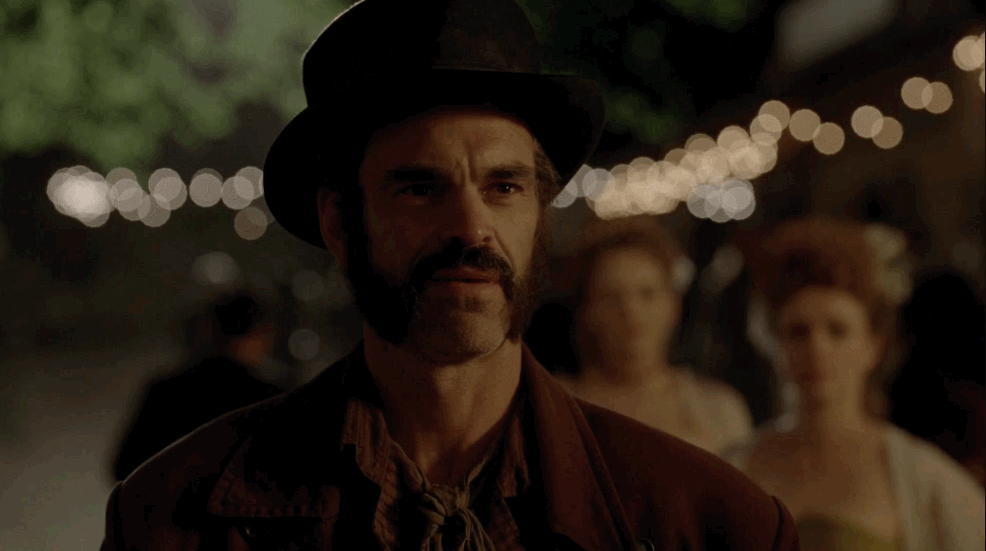
This is the “delight” part of “these violent delights have violent ends” (Gif of Westworld, HBO, by author)
The problem with Dolores, and Billy, has been that they have been the characters caught in a loop that we’ve seen explicitly played out twice. Bernard’s and Maeve’s were only hinted at, but Dolores has been switching between timelines over and over. She had the least “growth” as a character, up until the finale. It was suitably epic in the latest episode, but it didn’t seem to be going much of anywhere for a lot of the middle of the season. Watching the fallout of her actions here makes me actually look forward to seeing Dolores in season two. (By the way, if you want to know more about psychological theory and how it might affect the way things might shake out I recommend learning more about bicameralism, starting here.)
While, in general, I enjoyed the hell out of this finale, I feel like the first hour or so dragged a bit. There were a few things that could have taken the place of Dolores’ endless, inching self-discovery. Like a bit more foreshadowing of what the hell is going to happen with the information Charlotte smuggled out or what the hell was up with Elsie’s phone and the attack on the security chief. Was that because he knew about Bernard and Theresa? Because he was so good at his job, Ford needed him out of the way for the denouement? Did that character serve any purpose? Things like that. It took Dolores’ death scene for the whole thing to kick off and leave me sad we’re going to have to wait until 2018 for more.
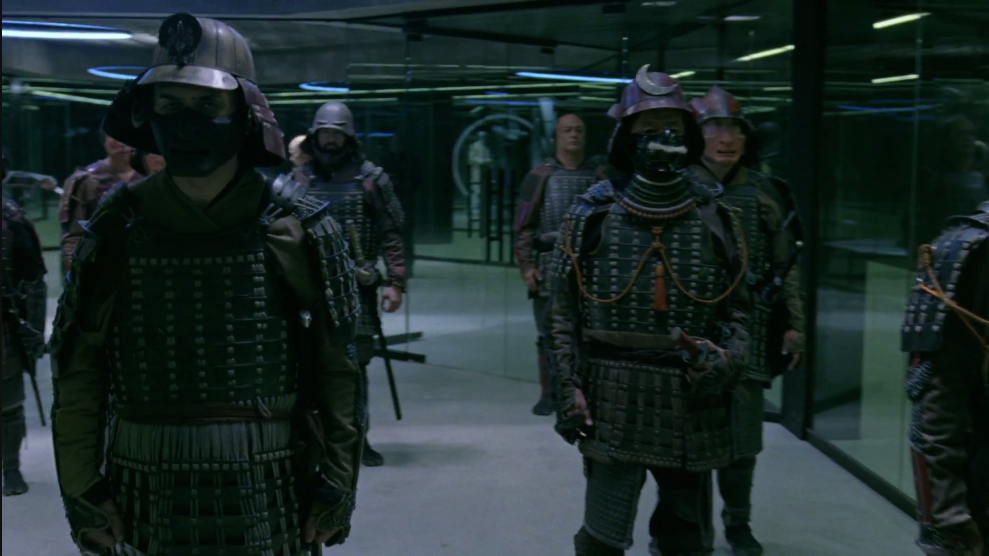
Image: Screencap, Westworld, HBO
Assorted Musings:
• We got a glimpse of new hosts being prepared for, presumably, another world. (Westworld is merely “A Delos Destination”, after all. And… I do not feel good about Samurai World. For a hundred different reasons. Felix says, “It’s complicated,” and he is right.
• Ford calls his new narrative “Journey Into Night”, which brings to mind Eugene O’Neill’s Long Day’s Journey Into Night, which included very unflattering versions of O’Neill’s parents, brother and self. Kind of like the host versions of Ford’s family that are still living in the park.
• Also, Ford’s apparently let all the hosts get abused in the park for years because he thinks suffering is what makes them better, which is a very extreme version of the garbage glorification of pain that the privileged like to espouse so that the less fortunate don’t realise they’re being taken advantage of. In this case, I think he thinks that it means they will be furious enough to scourge the earth of humans.
• Well, now Felix knows that Bernard is a host. I wonder how that will shake out — and if Bernard will openly be part of the rebellion or helps them undercover.
• It’s actually kind of weird how some hosts keep the same name forever and others trade off. Maeve and Dolores are always Maeve and Dolores, but two different hosts have served as Clementine.
• We all know that Anthony Hopkins only signed onto this because it was only one season for him, right?
• As much as it’s a shame, characterwise, that Maeve didn’t leave, I’m so glad she didn’t. This show is going to date itself hard once it has to create a whole actual future. And I didn’t want the second season to start with that shark-jumping moment.
• The staff getting stuck in the control room under security lockdown is a nice callback to the original film, where the same thing happened and they all suffocated when the vents shut down.
• The Armistice credits tag, where she cuts off her own arm to get away from security, made her even more badarse than before.
